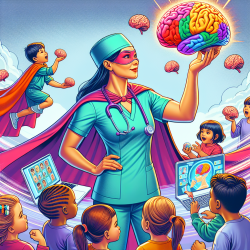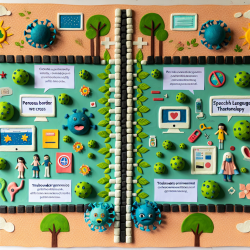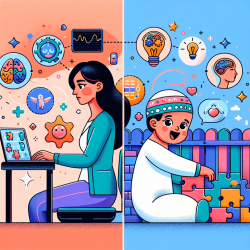The FAST Heroes campaign, a global school-based stroke education initiative, has shown significant promise in enhancing stroke literacy among children and their families. As speech-language pathologists (SLPs) committed to data-driven practices, understanding the outcomes of such programs can inform our approaches to educating children and improving community health. This blog delves into the findings from the research article "FAST Heroes: Results of Cross-Country Implementation of a Global School-Based Stroke Education Campaign" and explores how practitioners can leverage these insights to optimize their impact.
Key Findings from the FAST Heroes Campaign
The FAST Heroes campaign aimed to educate children aged 5 to 9 years old about stroke symptoms and the importance of immediate action. The program was implemented across 14 countries, involving 4,202 parents and their children. The primary goals were to assess the transfer of stroke-related knowledge to parents and evaluate the program's acceptability among parents and teachers.
Key outcomes included:
- An increase in parents' knowledge of stroke symptoms from 48% to 83% post-implementation.
- A significant rise in the correct identification of the emergency number from 51% to 85%.
- Long-term retention of stroke knowledge, with parents maintaining high levels of awareness six months post-implementation.
- High levels of program acceptability among parents and teachers, with 98.1% of teachers recommending the campaign to others.
Implications for Speech-Language Pathologists
As SLPs, we can draw several practical insights from the FAST Heroes campaign to enhance our educational initiatives:
1. Leverage School-Based Programs
School-based programs offer a unique opportunity to reach a broad audience, including children and their extended families. By integrating stroke education into school curriculums, we can ensure that essential health knowledge is disseminated widely and effectively.
2. Utilize Engaging Educational Materials
The FAST Heroes campaign's success was partly due to its engaging educational resources, including workbooks, cartoons, and web-based learning activities. Incorporating similar materials in our programs can make learning more enjoyable and memorable for children.
3. Focus on Knowledge Retention
Long-term retention of health knowledge is crucial. The campaign's use of repetition and spaced learning techniques helped reinforce stroke symptoms and appropriate actions. Adopting these methods can enhance the effectiveness of our educational interventions.
4. Encourage Family Involvement
Involving families in educational programs can amplify the impact. The FAST Heroes campaign successfully transferred knowledge from children to parents, highlighting the importance of engaging the entire family in health education efforts.
5. Measure Program Effectiveness
Regularly assessing the effectiveness of educational programs through surveys and feedback can provide valuable insights and guide improvements. The FAST Heroes campaign's systematic evaluation approach can serve as a model for our initiatives.
Encouraging Further Research
While the FAST Heroes campaign has demonstrated promising results, further research is essential to refine and expand these educational efforts. Practitioners are encouraged to explore additional studies on the long-term impact of stroke education programs and identify best practices for various cultural and regional contexts.
To read the original research paper, please follow this link: FAST Heroes: Results of Cross-Country Implementation of a Global School-Based Stroke Education Campaign.










